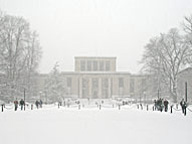C H A R T E R
Organization Name: Center of Excellence in Structural Health Monitoring (CoE SHM)
Preamble: The CoE SHM was formed in January of 2007 with funding from the Ben Franklin Technology Partners. The funding from Ben Franklin is matched at least 1:1 by other Center income and will last up to three years. Participants in the Center are Penn State faculty and research staff, while the Center membership is expected to be primarily companies and secondarily agencies and institutions.
Mission: Advance the state-of-the-art in structural health monitoring (SHM) to improve public safety, reduce maintenance costs, improve readiness, and foster a paradigm shift in design by leveraging and fostering collaborative R&D efforts between academia, industry, and government entities. Provide a means for transferring technology to member companies, agencies, and institutions.
Objectives:
- Spur the research and development of new SHM technologies
- Transfer SHM technologies to member companies to give them a competitive advantage
- Make PA a hotspot for structural health monitoring, creating a new high tech job market that will provide jobs for residents and draw people and SHM industries to PA
- Train students to provide an outstanding workforce pool in the SHM technology areas
Vision: Acquire at least 10 founding members in 2007. Continue to grow and become self-sufficient within 3-years. Acquire long-term support from a U.S. government agency to grow the Center to national prominence and to enable the Center to operate globally within 10 years.
Strategy: Leverage Ben Franklin funds to build relationships that will improve the competitiveness of participants and members for sponsored projects.
Definition of SHM: from Volume 1 of the journal Structural Health Monitoring…
- continuous or regular monitoring of the condition of a structure or system using built-in or autonomous sensory systems, and any resultant intervention to preserve structural integrity
- a broad multidisciplinary field both in terms of the diverse science and technology involved as well as its varied applications
- implemented on diverse systems and structures such as aircraft, spacecraft, ships, helicopters, automobiles, bridges, buildings, civil infrastructure, power generating plants, pipelines, electrical systems, manufacturing and processing facilities, biological systems, and for the protection of the environment, and for defense
Scope of Operations: Center participants are loosely organized in four working groups: aerospace, mechanical equipment, civil infrastructure, and biomedical, although there are overlaps. The strength of the CoE SHM is that it is multidisciplinary, which is the nature of structural health monitoring.
Faculty Expertise and Facilities:
- Lissenden, ESM, damage, fatigue, fracture, composites, ultrasonic guided waves; axial-torsion fatigue lab
- Smith, AERSP, rotorcraft, HUMS, damage detection for drive system, rotor systems, and structure
- Reichard, ARL, sensor systems hard/software for monitoring, data fusion; system health monitoring lab
- Rose, ESM, guided waves for monitoring aircraft, pipelines, rail; ultrasonics lab
- Trethewey, ME, condition based monitoring of machines, experimental modal analysis, signal processing
- Lopez de Murphy, CE, externally bonded fiber reinforced polymer repair systems, repaired concrete
- Cusumano, ESM, mechanics/dynamical systems theory, damage state estimation, data analysis algorithms
- Tittmann, ESM, physical acoustics, ultrasonics, sensor development & imaging; acoustic microscopy lab
- Conlon, ARL, monitoring rotor systems
- Chehab, CE, pavement materials testing and evaluation; civil infrastructure test ing and evaluation lab
- Todd, ESM, high temperature material behavior, pressure vessels, lasers
- Zhang, EE, transducer design, piezoelectric, polymeric, and composite materials for sensors
- Urquidi-Macdonald, ESM, complex phenomenon models, pattern recognition, neural networks, corrosion
- Costanzo, ESM, multiscale modeling of mechanical behavior, damage evolution, dynamic fracture
ESM = Engineering Science and Mechanics, AERSP = Aerospace Engineering, ARL = Applied Research Laboratory, ME = Mechanical Engineering, CE = Civil Engineering, EE = Electrical Engineering
Center Income Sources: Ben Franklin Technology Partners, membership dues, member sponsored projects and externally funded projects having results that are beneficial to and shared with Center members, in-kind contributions
Membership:
Full membership dues, $8,000 for small business, otherwise $20,000 Two votes on advisory board, non-exclusive rights to Center I.P., faculty assistance (1-day site visit, mini workshop, telephone), short course, meetings, technical reports, use of facilities, etc.
Associate membership dues, $4,000 for small business, otherwise $10,000 One vote on advisory board, non-exclusive non-commercial rights to Center I.P., short course, meetings, technical reports, use of facilities, etc.
Non-corporate membership dues, $10,000 One vote on advisory board, non-exclusive non-commercial rights to Center I.P., short course, meetings, technical reports, use of facilities, etc.
Note 1: A company sponsoring a project of $85,000 or more with a Center participant as the Principle Investigator will have its full membership dues waived for that year provided that the project follows the spirit of center funded projects, i.e., results are shared with members and any intellectual property rights belong to the Center.
Note 2: In the spirit of the Ben Franklin Technology Partners, Associate Membership dues will be discounted 25% for small businesses joining the Center in 2007.
Advisory Board: Comprised of one representative from each member organization. The advisory board will meet at each membership meeting (2 meetings/year are planned) to: 1) identify topics for Center RFPs from the participants, 2) make recommendations to Center management regarding projects for Center funding, 3) review progress of Center funded projects, and 4) recommend educational topics for short courses and meetings.
Center Funded Projects: Provided Ben Franklin funds are sufficient to cover Center administrative costs for meetings, short courses, participant travel, etc. the membership dues will be used for Center funded projects of general interest to members.
For information contact:
Cliff J. Lissenden, CoE SHM Director, 212 EES Bldg, Penn State, University Park PA 16802, (814) 863-5754 , Lissenden@psu.edu
Edward C. Smith, CoE SHM Assoc. Director, 233D Hammond Bldg, Penn State, University Park PA 16802, (814) 863-0966, ecs5@engr.psu.edu



